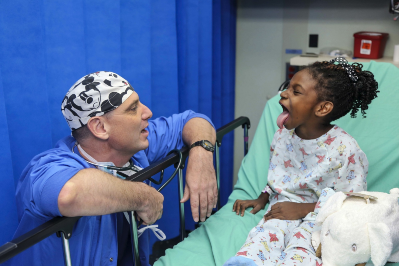
The ER is not always the most appropriate place for your sick child, and here are some things to consider:
- The ER doctor doesn’t know your child. The trust that develops over time between a doctor and a patient (or family) is absent. It is also extremely helpful to have seen a sick child when they were healthy, to know how far from their baseline they are.
- Your child doesn’t know the ER doctor. Sick kids are not happy kids, and it’s hard to do a physical exam on a screaming 2-year-old. A familiar face causes less distress, and allows the doctor to do a better evaluation.
- “Emergency” does not mean that you’ll be seen soon. The ER team takes care of the sickest patients first. If your child has a minor illness and a severely ill or injured child rolls in, you’ll be waiting a while.
- It’s expensive. Really expensive. It costs about $500 more to evaluate a minor illness in the ER than it does in an office setting–and that’s without any tests.
- Your child will probably have tests. This means needle sticks, radiation exposure, and increased cost. Often, your pediatrician could do a thorough physical exam and schedule a follow-up the next day. But the ER gets one shot, and they can’t afford to miss something, so they tend to over-order imaging and labs. I’m guilty, too.
- The ER’s job is to figure out what your child doesn’t have. They are not tasked with figuring out exactly what is going on and solving every problem; the focus is on ruling out life-threatening conditions and deciding which patients need to be in the hospital. This often frustrates parents who come in wanting answers.
- There are sick kids there. This week, our local ER will have been seeing 20+ cases of vomiting/diarrhea per day. In the fall, it’s RSV. In the winter, it’s flu. We do our best to keep things from spreading, but viruses haven’t survived this long by being bad at what they do. If your kid wasn’t sick when she went in, she may be soon.
- If the beds are full, really sick kids can’t be seen. This is more altruistic, like vaccinating your child so nobody else gets polio — but it’s real. Every ER has a limited number of beds and when they’re full, they’re full. If they’re full of relatively healthy kids, the really sick ones sit in the waiting room until a bed opens up.
Find a Cape Coral or Fort Myers pediatrician that you trust. This is the most important step, and it’s one that you should take when your child is healthy. A good pediatrician can identify diseases early, track your child’s growth and development, provide reassurance when that’s all you need, and handle the vast majority of acute illnesses. If (or, rather, when) your child gets sick, your pediatrician has access to her records and history, avoiding expensive and unnecessary repeat testing. He/she will understand your personality and perspectives, and your child will be less scared of a familiar face. Look for a doctor that has same-day sick visits, weekend hours, and phone availability even when the office if closed — a lot of ER visits can be avoided simply by talking through symptoms over the phone.
If your child has a minor illness (runny nose/congestion, cough without difficulty breathing, mild headache, fever without any alarming symptoms, vomiting and diarrhea without dehydration, etc.), stay at home. Use home care measures like saline drops and bulb suction for congestion, offering small amounts of fluids frequently to prevent dehydration, or controlling fevers with over-the-counter medicines (if you must). Call your doctor if you have any concerns, or schedule an appointment to be seen the next day.
If your child has an illness that has been progressing over several days or weeks, but is not in immediate danger, schedule another appointment with your doctor. There are many challenges in diagnosing childhood illnesses, many of which have similar symptoms at the onset, and it may take multiple visits to fully define the problem and best treatment. Many parents get frustrated by this and turn to the ER physician essentially for a second opinion. Because close follow-up and continuity is so important in these cases, this doesn’t tend to be very effective. If you don’t trust your pediatrician, find a new one.
Occasionally children have severe or even life-threatening conditions and need to be evaluated quickly. This is where the ER team shines — especially if you are fortunate enough to have a dedicated pediatric facility nearby (like
Golisano Children’s Hospital at Healthpark). The doctors, nurses, and staff are trained to handle life-threatening situations efficiently. Many pediatric centers will even have a Child Life Specialist whose job is to make the experience less stressful for your child. They have the equipment needed to handle respiratory problems, traumatic injuries, severe infections, and any other emergency that might roll through the door. They have access to the imaging, specialists, and interventions that are sometimes required to diagnose and treat these problems. If your child has a true emergency, the ER is the place to be.
MacKoul Pediatrics is an amazing local pediatrics office in Cape Coral, FL where caring, compassionate doctors and nurses work with you to keep your children as healthy as possible. MacKoul cares for children from birth to college age, from Cape Coral, Fort Myers, Naples, and beyond.
July 19, 2016

![[IMAGE]](http://static.mackoulpediatrics.com/images/858_ncqa_logo_centered.png)
 The ER is not always the most appropriate place for your sick child, and here are some things to consider:
The ER is not always the most appropriate place for your sick child, and here are some things to consider: